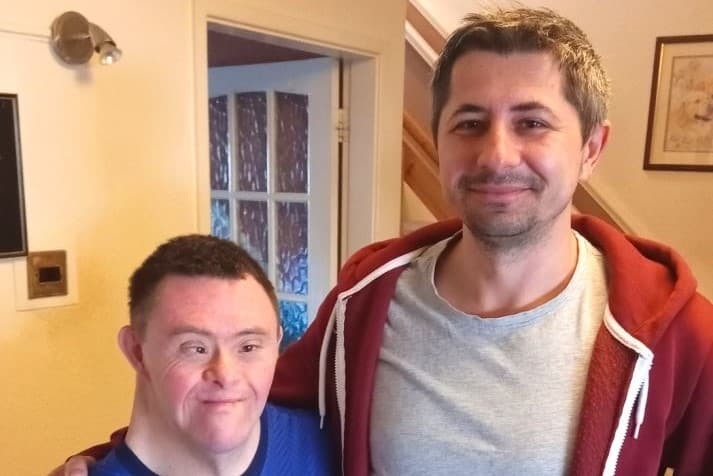Down Syndrome Care Plans
What Is a Down Syndrome Care Plan?
A Down’s Syndrome care plan is essential to ensure that someone living with the condition gets all the support they need. The NHS tells us that the care plan “outlines or maps the anticipated care a person with Down’s syndrome may receive in adulthood from a multidisciplinary and/or multiagency care team.” Having a care plan in place is essential for any adult who needs additional support because it will ensure that everyone involved in the care will work together and help them live their best life.

Why Should I Have a Down Syndrome Nursing Care Plan?
If necessary, a Down’s syndrome nursing care plan can be highly beneficial if the person has additional or more complex care needs that require a higher level of support. By having a detailed care plan in place, the person will be fully supported in their own home, without the worry of having to move into residential support. Helping Hands offers nurse-led care and support in our customers’ own homes so that, regardless of how complex your condition, you will receive person-centred care tailored to your requirements. Our clinical carers are fully instructed in every aspect of their customers’ support from our team of nurses who have many years of experience in both the NHS and private sector, ensuring you feel valued and understood.
Do I Need a Care Plan?
Having a care plan is important when it comes to getting the correct levels of care and support. It should be accessible by every member of the wider healthcare team that you may be in contact with as you get older, such as the community learning disability team in your area, your GP, and any other support services you access. It’s also important to have a plan that is flexible for the future and that takes into account what conditions you may be more vulnerable to as you age. For instance, people living with Down’s Syndrome are at higher risk of developing dementia as they age, thought to be due to the existence of chromosome 21, which they have an extra copy of. This can cause a buildup of protein, forming plaques in the brain, which are present in Alzheimer’s disease. The Alzheimer’s Society tells us that “Almost all people with Down’s syndrome will develop changes in the frontal lobe of their brain as they get older. This can cause similar symptoms to dementia, such as difficulties with decision making and planning, and changes in behaviour.”
What Should an Effective Down Syndrome Care Plan Include?
An effective care plan will include a range of information regarding how you want to spend your days. This will include practical tasks such as personal care and medication support, through to how you like to spend your spare time and what your hobbies are. Some people with Down’s syndrome work and live relatively independently, whereas others will live with family or in shared accommodation. Most people will need some additional support, even if only occasionally, and more so as they age; it’s therefore really important that the person has a regular health check to ensure that they are receiving all the help they need. This should also include an action plan that will give suggestions on how to remain as healthy as possible. The health check will provide a baseline by the age of 30 that the person’s health can subsequently be measured against for any changes over the years. A health check will contain information including:
Physical health
Hearing and eyesight
Any medication
Communication abilities
Mental health
Dementia symptoms
How I Can Create My Own Care Plan?
All care plans should be produced with as much input from the person as possible. This is because all care plans should be person-centred and focus on the individual’s preferences. Therefore, it is possible to create your own care plan while having expert input from healthcare professionals who have your best interests at heart, as well as family members and others who support you to live as independently as possible. You will know better than anyone what you like and don’t like, which is why your care plan should be built around you. Your routine will be respected at all times so that you can spend your days as you’d like to.
How Helping Hands Can Help
Helping Hands have been delivering individualised support for people living with Down’s syndrome, especially older people who have also developed symptoms of dementia, for many years. We’ve been established since 1989 and since then we have focussed entirely on caring for our customers in the comfort of their own homes, meaning you don’t have to move into residential support if you don’t want to. Our carers work tirelessly to help people living with Down’s syndrome to live a life full of joy and be content in their routine, no matter how much extra support is needed, and thanks to our knowledge and expertise, we’ll help you to do just that.

Fully regulated by the CQC / CIW
We offer care and support that can be delivered on both a visiting or live-in care basis, all fully regulated by the Care Quality Commission and the Care Inspectorate Wales. Why is being regulated important? Well, regulation by an outside body gives all of our customers peace of mind that their care is guaranteed to be of the highest quality. Being regularly inspected and monitored by the CQC and the CIW means that all of our care must remain of a consistently high standard and always will.
Our care teams across England and Wales will guide you through the process of sourcing care from us, whether you need us for a few hours or around the clock. We will work closely with you and your loved ones, where appropriate, to make sure that everything is tailor-made to your requirements, whether you’re living at home, moving into your own home for the first time, or living in a supported environment. From your very first call or visit we’ll explain your options clearly so that you and your loved ones can make appropriate choices.